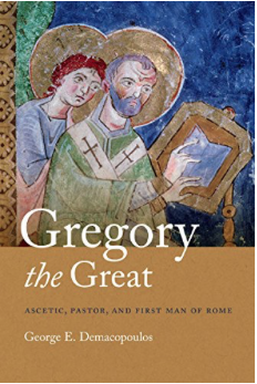posts
 Gregory the Great: Ascetic, Pastor, and First Man of Rome is the most recent work from George Demacopoulos, professor of Orthodox Christian Studies at Fordham University. Having written his doctoral dissertation on Gregory and spiritual direction, Democopoulos’ other related works include Five Models of Spiritual Direction in the Early Church (2006) as well as an updated translation of Gregory’s Pastoral Rule (2007). In terms of related works from other scholars, while the author has offered his own helpful literature review (pp. 4-9), this work particularly resembles Robert Markus’ Gregory the Great and His World (1987), Carole Straw’s Gregory the Great: Perfection in Imperfection (1988), and Conrad Leyers’ Authority and Asceticism from Augustine to Gregory the Great (2000). At the outset of the book, Democopoulos clearly states his thesis: “that Gregory’s ascetic and pastoral theology both informed and structured his administration of the Roman Church” (p. 11) and the work is divided into three main sections. In the first part, Democopoulos aims to outline Gregory’s ascetic theology in general. In the second part, he seeks to show how ascetic thinking shaped his pastoral theology. Finally, in the third section, he advances the argument that Gregory’s ascetic theology also influenced his leadership of the church at Rome. It is the third area that is arguably the most ground breaking because Gregory is generally remembered as a strong administrator whose style resembled that of a governor more than that of a monastic abbot. Through his argument, Democopoulous attempts to synthesize the “two Gregorys” that have been portrayed by other scholars. In his characteristic thoroughness, Democopoulos interacts with much of the Gregorian corpus to present his case. There is much to appreciate about this study. In part one of the book (pp. 19-30), the author does a good job discussing the tension of the contemplative life and the active life that ministry-minded monks such as Basil, Augustine, and Gregory wrestled with and addressed. Democopoulos makes a good argument that Gregory probably had the most developed ideas about this among the fathers; that he had “an ascetic vision that emphasized service to others as the climax of the spiritual and ascetic life” (p. 26). That is, a monk should gladly have his contemplative experience of prayer, fasting, etc. interrupted in order to serve others. While I think Democopoulos has made a good point here, this advanced loving God/loving neighbor aspect of ascetic theology probably also informed Gregory’s passion for cross-cultural mission to the Lombards and especially to the Anglo-Saxons. Though the author dedicates chapter 13 of the book to these mission efforts, a monastic theology of service expressed in mission was absent. I think further reflection in this area of Gregory’s ministry would strengthen Demacopoulos’ overall “service as the climax” argument. I think Democopoulos also succeeds in part two of the book by showing Gregory’s integrated ascetic and pastoral theology. In particular, he argues that a key component of being a pastor was being a spiritual director (cf. pp. 53-56), which was strengthened by ascetic concerns. He builds his argument not only through a good treatment of Gregory’s Pastoral Rule but also by exploring parts of the Gregorian corpus that are not as overtly pastoral in focus, including his commentaries on Job and Ezekiel and his homilies on the Gospels. A final strength of the work is in part three—in which Democopoulos attempts to connect Gregory’s asceticism with his practical leadership of the Roman church—as the author presents Gregory’s regard for Peter. Unlike other Roman bishops, Gregory presents Peter as weak and fallible and it is this weakness that actually makes him a strong and model leader (pp. 153-155). While this character analysis of Peter toward the office of bishop certainly supports Democopolous’ acetic theology connection to leadership, I found the remainder of part three of the book a bit less convincing in making the connection between Gregory the monk and Gregory the strong, prefect-like leader of the church at Rome. In short, this is a profitable and useful study of the famous Roman bishop through the lenses of ascetic theology. While graduate students and scholars and students of early Christianity would benefit most from this book, it is written at such an accessible level that interested undergraduates and possibly pastors would profit from it as well. |
Archives
November 2023
|
 RSS Feed
RSS Feed
